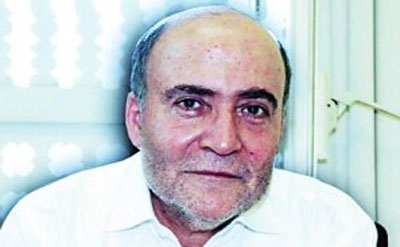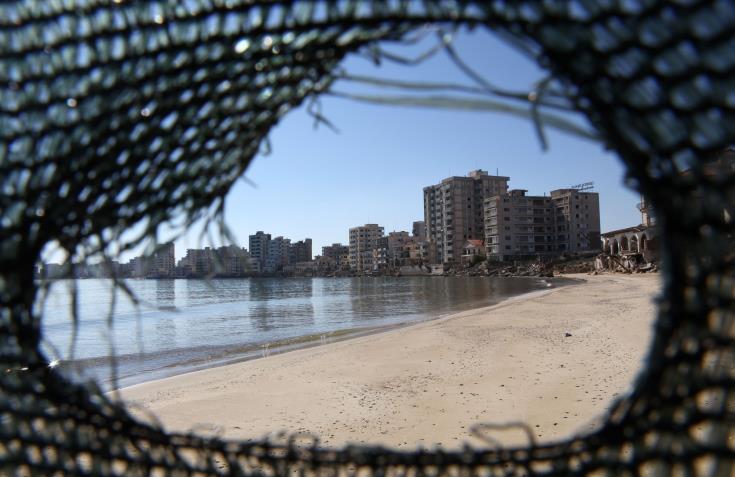
Excerpts from an interview with Toumazos Tsielepis, member of the Political Bureau of AKEL and Head of the Bureau on the Cyprus Problem of the C.C. of AKEL
Sunday 24th April 2016, “HARAVGI” newspaper
 Bearing in mind the political developments in the occupied territories and the election campaign in the free areas, do you consider that a momentum still exists for a solution to the Cyprus problem?
Bearing in mind the political developments in the occupied territories and the election campaign in the free areas, do you consider that a momentum still exists for a solution to the Cyprus problem?
TT: There are two extreme positions expressed on the developments in the occupied territories. One position argues that nothing is occurring because it is Turkey that decides, regardless of who is in power. The other extreme position argues that the momentum has been lost and that nothing can be done. The momentum has not been lost because it is due to objective reasons. International players that exert an influence on the Cyprus problem – the EU and the US – continue to have serious interests in wanting to see a solution; interests related to the EU-NATO issue where Cyprus and Turkey block each other, as well as the gas issue which they want to exploit.
Turkey is virtually on a war footing with many of its neighboring states. Turkey knows that it cannot advance its European accession course forward, nor can the Turkish Cypriots benefit, and possibly Turkey itself, from the natural gas without a solution of the Cyprus problem. All of these assessments are valid. However, the developments in the occupied areas are alarming because at this precise time parties that do not accept the agreed framework of the solution – that is to say bi-zonal, bi-communal federation – have the upper hand. The current juncture does not operate by itself; it must be confirmed at the negotiating table. And here lies the difficulty.
Is a solution in 2016 feasible and under what conditions?
TT: It is a difficult question. I cannot make a prediction, but for sure I can say that for the process to move forward it is necessary to overcome the hurdle of the property issue. Unfortunately, the long-standing position of Turkey and the Turkish Cypriot side is that without resolving the remaining internal aspects of the Cyprus problem we cannot reach the final stage, as they say, which is the discussion of the territorial issue with swift procedures and subsequently the issue of security and the guarantees, which in fact must be discussed in a representative international conference, given that third States are involved here conventionally. Therefore, if we cannot come within range of an agreement on the property issue we cannot proceed further. If this situation continues for several months more, we will then come close to the presidential elections and the threat of the negotiation procedure collapsing will be real.
What about the efforts AKEL is undertaking with Turkish Cypriot parties so that you can to make your contribution towards overcoming such obstacles?
TT: As you know we have established working groups with three parties, namely the Republican Turkish Party CTP, the Communal Democracy Party TDH and the United Cyprus Party BKP. It is true that an effort is underway not to substitute the negotiations, but to discuss problems arising from the process, to find a common language and then to subsequently forward them to the leaders of the two communities. We are generally satisfied with this effort. It is bearing fruit and I think it should be stepped up after the parliamentary elections.
Is there a tangible result?
TT: For example, on the issue of the Turkish Cypriot side’s insistence on guaranteed majorities of population and land, which also impinges on the Christofias-Talat convergence that there are no restrictions on the issues of basic freedoms, we have found common ground. We have also reached agreement on the criteria for property restitution. The same also applies to the issue with regards the demographic structure.
Three months after AKEL’s visit to Ankara do you consider that your assessments about Turkey’s intentions on the Cyprus problem are being vindicated?
TT: Let me recall that Turkey tried to persuade us with its arguments that the solution of the Cyprus problem is in everyone’s interest. We said and we reiterate at every opportunity that these declarations will be judged at the negotiating table. Is Turkey prepared to take its share of moves, which also constitute the essence of the Cyprus problem itself, to reach a solution? We will only get an answer to this question if and when we arrive at a substantive discussion of the territorial issue, particularly on the chapter of security.
Is the fact that Turkey is seeking the opening of chapters a sign that it actually wants a solution in 2016?
TT: It is a sign that Turkey is still aiming at its accession to the EU, which is why it is so insistent on the opening of chapters. But we have conveyed the message that this presupposes Turkey’s compliance with its Cyprus-related obligations. The freezing of the chapters is not an end in itself, but a key lever and vehicle for exerting pressure on Turkey to cooperater for a solution of the Cyprus problem.
Although AKEL has made clear that it never changed its positions and will not abandon them now that it is vindicated so as not be accused of collusion with DISY, nonetheless this accusation is a constant refrain from the other opposition parties. What are your comments?
TT: It will continue to be a constant refrain, because our very convincing answers are being dealt with by the repetition of this worn out slogan. Is it or is it not a fact that from late 2009 until the Anastasiades -Eroglou Joint Declaration in February 2014 all the other parties stood shoulder to shoulder in the political rejection of the Christofias-Talat convergences and from the beginning they supported negotiations from scratch, while AKEL insisted on continuing the procedure from where it had left off?
We disregarded the political cost of our solitary path all these years and we have been vindicated by developments themselves. The policy of all the other parties led to an impasse. When the Turkish vessel “Barbaros” was roaming in our southern coasts we received the worst report submitted by the UN Secretary-General since 2004. It was of course unfair, but it happened because the Turkish Cypriot leader Eroglu, aware of the President of the Republic’s difficulty with the convergences declared that he himself supposedly accepts them. He played it safe and won the blame game.
Subsequently the President changed his line and he did well to do so, without this meaning that all our differences had been overcome. The change in the line pursued was not made by us. The pressing need is not who goes along with whom, but instead what the correct line is. Those coming towards the policy of AKEL are welcome… They insist on propagating the same old damaged argument about a supposed collusion between AKEL and DISY, while they themselves stood shoulder to shoulder in collusion for five whole years on the Cyprus problem, and of course they continue to be in collusion on socio-economic policy issues and the Memorandum.
DISY thanks these political forces because they support its policies…
TT: The most excellent cooperation on these issues is between DISY and DIKO. Indeed many serious Memoranda bills were approved in parliament by just one vote difference, which proves how important it is to strengthen AKEL in these elections.
What message do people convey to you in this election campaign?
TT: Things today are significantly better than they were since the last European elections. The atmosphere is changing and this is normal, because three years after the presidential elections they can’t say that Christofias is to blame for everything. Its one thing to make mistakes and quite another when they burden you with crimes committed by others, such as the destruction of the economy by, according to DISY, the “best bankers in the world.” The vast majority of citizens understand this now, as young people also understand that abstention is not an option. Abstention is not neutral, nor does it punish all. It is in fact a vote for the policy being pursued today. This is precisely what we are trying to explain.
There is an orgy of propaganda spread by DISY. A DISY candidate recently said that left policies have impoverished the people.
TT: Left policies, which aimed to provide help the poorest strata of the people, amounted to a total sum that did not exceed 400 million Euros over the five year term of the Christofias governance and not the 20 billion Euros that the bankers lost in their speculation and gambling which they subsequently loaded on to the state and the depositors! No matter how much propaganda is being made, in the end the truth will always come to light.




